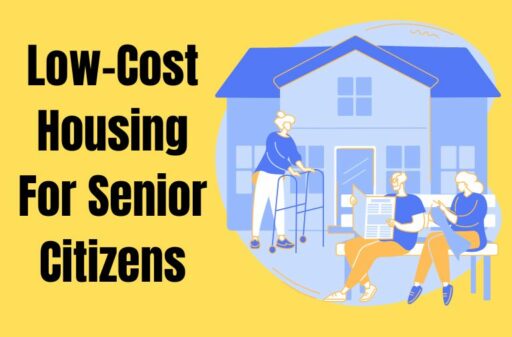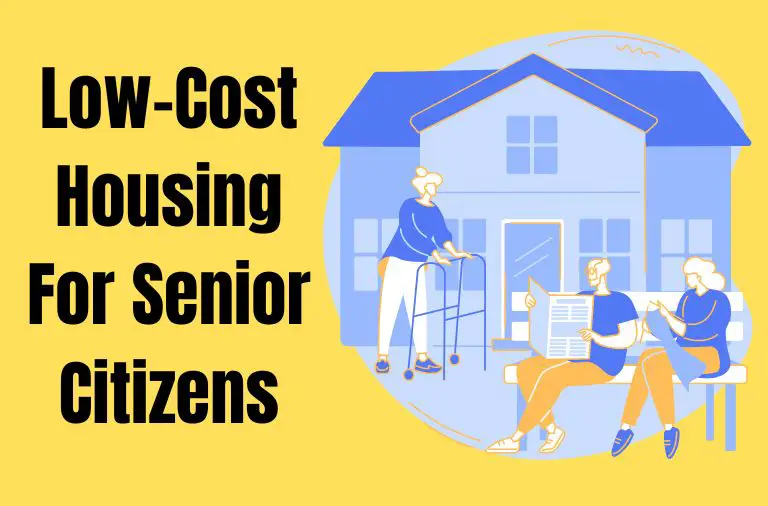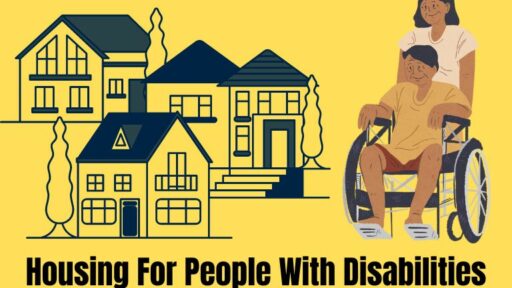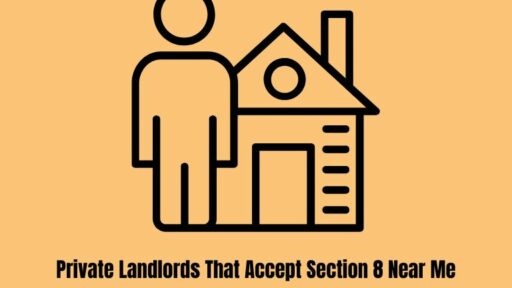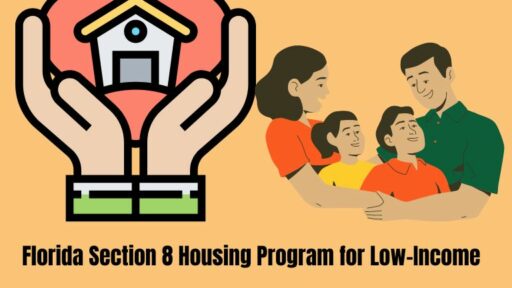What is some Low-Cost Housing For Senior Citizens? Because many people need the opportunity to save up a small fortune before retiring. The Social Security system provides fixed incomes to many seniors.
However, they may need this income to cover their housing expenses. Rent expenses are more than half of seniors’ monthly income, nearly 30%. A low-income senior may need help finding housing that fits into their budget.
It is a blessing that the government has created low-income veteran housing assistance programs and many nonprofit organizations. Several of these options will be discussed in this article.
Table of Contents
What is Some Low-Cost Housing For Senior Citizens?
Senior housing options in the U.S. remain in demand as the aging population grows. Seniors often need help to afford both housing and care. About 25 percent of seniors who own their homes and 54 percent of those who rent are cost-burdened (spending more than 30 percent of their income on monthly housing).
It is crucial for older adults living on fixed incomes to find affordable senior living facilities. This is even greater for people living below the poverty line. Below are some programs and other innovative solutions to help seniors afford to house, along with tips on making the most of your budget.
What Is Affordable Senior Housing?
There are different definitions of “affordable” among different people. Whenever we use it to describe senior housing, we refer to low-income housing or affordable housing for retired people also if you are a single father then there are Housing Assistance Grants For Single Fathers available. Housing costs should not exceed 30 percent of a senior’s income or any other age group. A housing cost burden is spending more than that percent on housing.
How to Apply for Low-Cost Housing For Senior Citizens
You can apply for public housing through your local public housing agency (PHA). Please provide references that attest that you will be a good tenant and not engage in disruptive behaviors. It will also be necessary to provide your birth certificate, tax records, and banking information. To prove your legal immigration status, you must provide documentation if you aren’t a U.S. citizen.
What Are Some Low-Cost Housing For Senior Citizens?
Finding affordable housing for seniors is difficult, especially in large cities. The good news is that you don’t have to give up. If you research, wait for a little, and keep an open mind, you can find senior housing solutions within your budget. Several options are available. Let’s take a look at them.
Low-Cost Housing For Senior Citizens
Some apartment and condo complexes are exclusively for seniors on low incomes. With this option, you can live in your own private space at a price you can afford. Your adjusted gross income (AGI) is generally at most 30 percent of what you pay for your living space. Rent will be at most $300 if you have $1,000 AGI monthly. Many government programs, nonprofits, and other organizations subsidize the program’s cost.
There are other benefits to living in a low-income senior apartment as well. Elevators and shower bars are among the accessibility features offered by many hotels. Additionally, you can avoid loneliness and depression by living among peers if the age requirement is 55+ or 62+.
The internet is a great resource for finding low-income senior housing options near you. There are also nonprofits that you can turn to. The following nonprofit housing organizations provide low-income housing to seniors:
Volunteers of America
This nonprofit organization manages a network of 484 properties in 40 states and Puerto Rico. Low-income senior housing units, assisted living facilities, and skilled nursing facilities are available for seniors. You can find housing in your area by searching by ZIP code on their website.
Good Samaritan Society
Religious housing is provided for older adults under a tight budget by this evangelical Lutheran organization. There may be a branch of the Good Samaritan Society in your area that can help you find a budget-friendly senior apartment. There is no minimum age requirement. These services are available to anyone, but you must show proof of income if you are not a Lutheran.
HumanGood
Eight thousand eight hundred eighty residents live in this nonprofit’s 100 affordable senior housing communities across five states. It is required that you are at least 55 years old. The company serves seniors in California, Delaware, Oregon, Pennsylvania, and Washington.
Mercy Housing
Low- and moderate-income residents have access to affordable communities provided by Mercy Housing, a national nonprofit organization. Seniors are included in this! Residents can access health and wellness support, financial stability, and community involvement in most properties.
Cooperative Housing for Seniors
A cooperative housing community isn’t one of the cheapest options on our list, but it can be cheaper than retirement communities or staying at home. Co-ops are companies that own their buildings and land. The company offers senior citizens the opportunity to purchase shares.
A lease includes access to fitness rooms, community kitchens, laundry facilities, and outdoor spaces in exchange for the use of housing units. In addition to purchasing shares, you must pay monthly fees for “master mortgages,” taxes, utilities, maintenance, and repairs.
It’s an investment for older adults to move into a co-op rather than an apartment. While co-op shares grow between 1 and 2 percent yearly, their goal is not to make money. All members should benefit from improved quality of life.
The building’s management is decided by its members. The company or another member can buy back your shares if you need to move out of the co-op. Your shares are valued at their cost plus any equity you have accrued.
You can search for senior cooperatives using the Senior Cooperative Foundation’s website. U.S. seniors have access to over 125 cooperatives.
HUD Housing Programs
The Department of Housing and Urban Development (HUD) offers a low-income housing program for seniors.
Section 8 Housing Choice Vouchers
Section 8 is a housing choice payment voucher that may help low-income seniors afford their rent. The vouchers are distributed by local Public Housing Agencies (PHAs), but you are responsible for securing your housing. Apartments, condos, single-family homes, and townhouses can all fit this category.
It is imperative, however, that the landlord agrees to rent to the program participants. Direct payment will be made to your landlord by the PHA. You will then pay the difference to your landlord. You can apply to the PHA in your area.
The waitlist for HUD housing is often lengthy, but older adults who are homeless or without adequate housing may be able to find immediate housing.
Section 202 Supportive Housing for the Elderly
The government helps fund the construction or rehabilitation of multifamily properties for seniors aged 62 and over with very low incomes. The Section 202 apartment complexes provide low-income housing for seniors. Many of these houses are designed to be self-sufficient but can also provide support services like cleaning, transportation, and cooking.
The government subsidizes your rent if you move into a section 202 property. There will be a 30 percent tax on your adjusted income. Your household income must not exceed 50 percent of the Area Median Income for eligibility. It is also necessary for at least one member to be over the age of 62.
Virtual Retirement Communities
A virtual retirement community allows senior citizens to save on housing costs while staying home. Older adults can access various accessibility services through virtual retirement communities, which are grassroots, nonprofit organizations.
Neighborhoods helping neighbors is a good idea. Members of a virtual retirement community can ask for transport, do grocery shopping, have tree removal done, or go on group outings. Retirement communities provide some benefits without requiring you to move there.
Virtual communities have fees as low as $125, although the average is $450 per year3. Wages and activities, as well as support services, are included in the fee. There is no better place in the U.S. to find affordable senior care than here.
You can find virtual retirement communities in your area by visiting the Village to Village Network website. If you are looking for virtual retirement communities near you, you can do a web search for them.
Adult Family Homes or Adult Foster Care
An adult family home is a form of foster care in which up to six seniors live together in a home setting. Residents have their rooms but share common spaces like the living room and kitchen.
The Department of Family Services must approve, license, and supervise these residential homes. Besides paid supervisors, the home employs a team of counselors, nurses, dietitians, and social workers. Assisted living provides older adults with meals, housing, social services, and assistance with daily needs.
These affordable senior housing options are intended for seniors who require little medical care and do not require a high level of care. It is more affordable than assisted living facilities, despite costing more than low-income seniors’ apartments. If you are interested in learning more about adult foster care homes in your area, don’t hesitate to contact your local Department of Family Services.
Move in With Family
The U.S. has only 6 percent of adults older than 60 living in extended-family households, compared with 38 percent worldwide. However, you should consider it as an option only because it’s common. A child, a niece, a nephew, an adult grandson, or a relative can move in for free or cheaply. In addition, you will have loved ones nearby to assist if needed.
You and your family should sit together before entering this living arrangement and discuss what you expect. Discuss whether any changes need to be made to the home to make it safer and more accessible. It is a mutually beneficial arrangement for many families. Grandparents can care for their grandchildren, and their aging relatives can gain peace of mind knowing they are cared for.
Find a Roommate
College students aren’t the only ones who have roommates! The number of people living with roommates (or housemates) over 50 is rising. You can keep your mortgage, property taxes, and maintenance costs down by adding a housemate (or two) to your house.
Living alone can be quite expensive for seniors, so living as a roommate also helps them save money. The social benefits are also worth noting! An increased rate of depression is associated with loneliness and social isolation, which can be dealt with by maintaining stable social connections.
It is possible to find other older adults to live with through a handful of nonprofits and companies:
- Foundation for Senior Citizens of New York: Seniors with spare rooms in their homes are partnered with potential roommates through this organization. Social workers screen all applicants, and social workers match potential roommates. It is important to ensure that both parties live in a comfortable and affordable environment. There must be at least one person over the age of 60.
- Homeshares for seniors: You can use this free listing service to find a roommate or to advertise your home for free. The best part is that it is exclusively for older adults. Then you are matched with potential roommates based on your profile. Adding a “helper” to your account (like your child) can ease your tech skills. Then, they can help you find the right match by filling out your profile.
- The Silvernest: Homesharing arrangements can be found and entered into through this site. In your profile, provide your personal information and what you are looking for in a roommate or a home environment. You can then browse matches in your area. There is a free and paid version of Silvernest. For everyone’s safety, we recommend the paid version, which includes a background check.
How Do I Find Low-Cost Housing For Senior Citizens Near Me?
HUD public housing authorities can help you find low-income housing. The office will direct you to the next step upon receiving your application. You can also speak with a representative about your housing needs by calling 211 or visiting your local 211 websites. Housing, food, health care, and transportation are among the basic needs Americans can meet through 211 agencies.
You can also find a lot of information on the internet. Enter your city and the type of housing you’re interested in. You can search our senior living directory by state or ZIP code to find senior living services in your area, such as “low-income senior housing in Philadelphia.”
How Do I Pay for Senior Housing?
The cost of living is still a concern even if you find an affordable place to live. Various methods cover housing and care costs for older adults.
You can pay in a variety of ways, including:
Income from Social Security
A retiree’s average monthly Social Security benefit was $1,669 in 2022.6 Many seniors depend on Social Security and other retirement income to pay for their senior living or senior housing costs, such as pensions and investment accounts.
Renting or Selling Your Home
It is possible to sell or rent out your existing house if you plan to move in with family, into an apartment, or a senior living community. If you are living in a senior living community, you can use that money to help pay for the costs associated with aging.
Vouchers for Housing
A housing voucher will allow you to pay up to 30 percent of your adjusted income on rent if you qualify.7 About half of all housing voucher recipients are seniors or disabled households. The rest of the money is paid for by the government.
Insurance for Long-Term Care
Long-term care insurance can cover the cost of moving into assisted living, memory care, or a nursing home.
Funds from Other Private Sources
Families use various methods to care for their aging loved ones. While living on a fixed income, seniors sometimes receive help from younger family members to cover living costs.
Will Medicaid or Medicare Pay for Low-Cost Housing For Senior Citizens?
The coverage offered by Medicaid and Medicare can be confusing. Medicaid or Medicare cannot cover assisted living facilities, low-income housing, and mortgages.
It is possible, however, to move into an assisted living facility for a lower cost through Medicaid. The Medicaid program may allow you to pay for assisted living services, such as personal and nursing care in an assisted living facility. Room and board are not allowed. Medicaid coverage varies by state, so contact your state Medicaid program to find out if you are eligible.
Budgeting Ideas for Seniors on a Fixed Income
“Affordable housing” is relative, so it’s helpful to understand exactly what you mean by it. Making a budget is a good place to start. It’s easy to make a budget when you’re on a fixed income because you know your monthly income. You might be unable to cover all your expenses with your fixed income.
Write down your mandatory expenses to determine if your fixed income can handle your expenses.
These include:
- Housing
- Food
- Medicine
- Medical insurance
- Transportation
You should think beyond mandatory expenses when preparing your budget. Miscellaneous expenses, such as emergency expenses, should be included. The best place to begin is by reducing your mandatory expenses.
You can do this by taking each category and identifying a more affordable way to meet it. Living in independent senior housing or renting a senior apartment is cheaper if you own a home. If the home is older and needs repairs, it may be costly to maintain, pay property taxes, and maintain the house. Consider moving in with a roommate or your family if you need help finding an affordable place to live in your area. You can lower your housing costs by doing all of these things.
Consider how much you spend on car insurance, gas, maintenance, and repairs if you own a vehicle. Is it a better deal if you sold the vehicle, put the money into savings, and used public transportation or a virtual retirement community? You can create a budget that helps you spend within your means by evaluating your expenses and developing ways to cut costs.
Check out our financial guide for seniors as you work on building a budget and arranging your finances. Making your money stretch and planning for expenses are important topics we cover.
Assistance for Low-Cost Housing For Senior Citizens
People who meet certain qualifications, as well as being low-income, may be eligible for assistance:
- People with disabilities can live independently with the assistance of Section 8 Supportive Housing.
- The Veterans Affairs Department (VA) covers several services in assisted living and other residential facilities, although the program does not cover room and board. HUD’s Supportive Housing Program aims to make life more comfortable for homeless veterans by providing them with housing and supportive services.
- The USDA offers a searchable map of affordable multifamily housing rentals across the country to assist older adults looking for a new place to live.
- With its online directory of government-sponsored housing, assisted living facilities, home health care, and other helpful programs, the National Resource Center on Native American Aging provides an invaluable resource for older adults nationwide.
FAQs
What is the Cheapest Way for a Senior to Live?
A virtual retirement community can help seniors save money by staying home and reducing their housing expenses. Elderly adults can receive various accessibility services through virtual retirement communities, which are grassroots, nonprofit organizations.
Where is the Safest and Cheapest Place to Retire?
There is no better place to retire than Charleston, Illinois. Visit one of the many trails surrounding Lake Charleston and enjoy everything it offers. This city has the lowest cost of living on this list: $36,915 per year.
What is the Most Affordable Housing Option?
Several affordable new homes can be found in prefabricated, container, and monolithic dome homes. You’ll need to factor in costs related to land, a foundation, taxes, transportation, and permits. It is also possible to save and buy an existing fixer-upper home.
Conclusion
The retirement years should be enjoyed stress-free, without worry about income. The reverse mortgage calculator can help you determine how much a HECM loan may help you improve your financial situation if you are not eligible for elderly assistance or the HUD wait lists are too long for your urgent needs.
